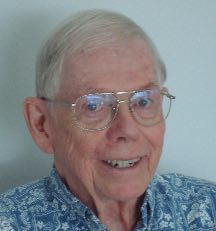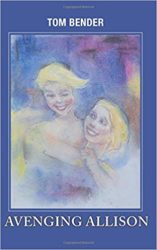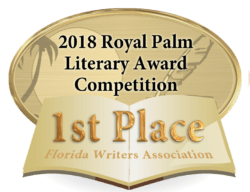
No one knows how to cut, cut, cut quite like a journalist. After ten years in the newsroom, Tom Bender learned how to write lean copy, a skill he uses in his novel writing regularly. His experience as an editor, speech writer, and professor may also have something to do with his excellence in writing. But those years working as a journalist have stayed with him and even inspired the creation of the unforgettable reporter Morrison, the main character in Avenging Allison. This novel won First Place for Blended Genre in the 2018 Royal Palm Literary Awards. Tom talks crisp prose, authentic dialogue, and integrating personal knowledge in this week’s RPLA showcase.
Tom’s Writing Journey
While I was in college (the University of Illinois in Urbana-Champaign) I became the editor of my college paper and happened to spot the novelist James Jones in the campus drugstore. My interview of Mr. Jones led to my life in the writing business—as an editor at a community daily, as a speech writer, as a professor of communication in an MBA program, and, in retirement, as a novelist and editor.
Journalism Teaches Crisp Prose
After college, I spent ten years in newsrooms. There’s a newsroom joke about writing: A cub reporter covers a fire and turns in this lead: “Firefighters caught a two-year-old baby tossed from a flaming third-floor apartment in the Essex building on Third Street Friday night, but were unable to save its mother, Mrs. Aleta Jones, who was heard screaming piteously as she perished in the flames.” The news editor rejects this, and several more of the kid’s attempts as well, each time saying, “Cut.” Finally, the kid turns in this lead: “Dead.” (paragraph) “That’s what Mrs. Aleta Jones is.” (paragraph) “DETAILS TO FOLLOW.” The point of the joke is to get to the point. Hemingway apprenticed at the Kansas City Star, and learned to write crisp stories. Reading his prose as I grew up, and apprenticing in a newsroom as he did, I write lean copy, and delete stuff further as I edit. Is that good? I think so or I wouldn’t write so.
The Winning Entry, Avenging Allison
Logline: A child unleashes mayhem by telling his brother he saw a man falling in the sky. A reporter’s daughter is hit by a car. Outraged, he tracks down a psychopath.
We have a heritage in our country of domestic terror. I wanted to capture a sense of the issue and create a character balanced enough to dispassionately expose a case of it. As the story unfolded I wanted to make it personal for the character—turn up the heat. So I gave him a vulnerable young daughter and put her at risk.
I chose southern Illinois, with its history of violence, as a setting, created the character, Morrison, and made him a journalist—a reporter for a small-town paper. I depicted a time (1986) when community newspapers were fading away, abetting an atmosphere of deterioration in citizens’ awareness of what was going on locally.
I wanted the local sheriff and the FBI distracted by other events. Thus my protagonist, the journalist, would be forced to operate independently
In the end I had a story I liked, all hell breaking loose in a small town, a story of America’s past and future as I sense it, laced with the humor and sweetness that good people and their children can introduce to a tale.
Read an excerpt of Avenging Allison here
Two Truths and a Lie, Writer’s Edition
Don’t sweat the small stuff; get on with your draft.
Write like you talk.
Reading makes for good writers.
The lie? Don’t sweat the small stuff. I have found it not true that a good story can be drafted and later “fleshed out.” I have found that a story builds on its nuances, and, like a train, can be derailed.
You should write like you talk. I heard this first from a journalism professor at the University of Illinois. To my mind, nothing is more true. My voice is essential to me; otherwise, pretty soon, my characters begin to sound false. Consider, for example, introducing a character with a German accent; his or her remarks become a parody. An occasional turn of phrase that suggests that a character’s first language is other than English works for me, but only after I create the character’s speech in my own voice. So it is for other aspects of voice as well.
Reading is also essential. How can you play the piano without a sense of music? I can “hear” the good American writers whose books I read growing up—Faulkner: “Old Priam, reft of us sons”; Hemingway: “Isn’t it pretty to think so?”; Steinbeck: “Being at ease with himself put him at ease with the world”; many others.
Other Works by Tom
I’ve written two other novels: Run For It! is a Young Adult novel set in 1939; two boys get in behind the Irish mob (the Clan na Gael) only to be chased themselves by the Chicago Italian mob—an ice cream sandwich that takes them from Chicago to Campobello Island, where they meet Mrs. Roosevelt. Cemetery Plot is the prequel to Avenging Allison. Reading the one before the other is fun but not necessary.
Up Next for this Author
I’m working on another novel about Morrison, who has turned out to be a fascinating character. A Shawnee Forest ranger calls in a helicopter to pick up an apparently injured woman, but she, or her body, has vanished. What happened? I don’t know yet myself. Writing thus (without outlining), I’m as surprised as my readers by turns of events.
Connect with Tom
I wish people would go to my web page, www.tombenderbooks.com. My son Jim works hard on it, and he’s a child of our time, a person who understands IT. The page is designed so you can read it spread out, on a computer, perhaps, or compressed into several columns, each of them readable individually on your mobile phone.
More About RPLA
The Royal Palm Literary Awards competition is a service of the Florida Writers Association established to recognize excellence in members’ published and unpublished works while providing objective and constructive written assessments for all entrants. Judges include literary agents, publishers, film producers, current or retired professors, teachers, librarians, editors, bestselling and award-winning authors, and journalists from across the nation. Entries are scored against the criteria set by RPLA using rubrics tailored to each genre. Winners are announced at the annual FWA conference during the RPLA awards banquet. To learn more about RPLA, click here for the guidelines.


Teresa Edmond-Sargeant
Tom Bender is absolutely right. I’m a journalist myself, so I understand the necessity of cutting, cutting, cutting to get straight to the point. In journalism — as with many types of writing — every word counts. There’s no point in writing a 10-word sentence when it can be said in three.
Arielle Haughee
You’re absolutely right! It helps the reader follow along with the plot better if there isn’t any cluttered prose slowing them down.
JIm McGurk
Dear Tom,
“Write like you talk.” Is the best a writer can do. Academia destroyed writing. I’m 84, gonna enter my 85yr of breathing in April 2019. Have HSD1953, and been writin’ for 35yrs. Write short stories from neighborhoods like my old one in Phila., Pa. Nutin’ like an Italian Bar/Restaurant, or a slug fest in an Irish Bar/Restaurant. I’m not published but have a good rep as a, so called Writer. I advise would be writers, “wanna learn how to rite, use twitter for all yer long winded bs. Works every time. Oh, bty, was in a group I attend listening to a major Publisher and Editor. He was explaining the word, “everyday” as it doesn’t fit everyday. Had to remind the jerk, a homeless person in the woods wears his everyday shoes.
Karen Coody Cooper
I was a stringer for a newspaper in 1980, but they didn’t ask me to collect my pieces. They kept track and paid me accordingly. I forget how much they paid per inch, but I remember that a photo got me $5. I attended town meetings, school events, followed fire trucks, and had a nose for news. The editor was a cigar-chomping guy who never seemed satisfied with my work, until, as I had promised him I’d do the job for a year, I turned in my last piece (dictating over the phone to a stenographer) a recounting of highlights of the year. That crusty editor called me, said the piece was wonderful, and made my day. I always felt that having majored in journalism destroyed my ability to create fiction because I could never elaborate beyond the bare facts. So, I felt doomed to write history books instead. And that has made me happy enough.
Joni M Fisher
Congratulations to Tom Bender! From journalism to fine fiction, he’s a writer through and through and a fine gentleman as well! Success suits him.
Tom Bender
How sweet to hear from fellow writers, among you a dear old friend who lives far from me. Thank you. Thanks to Arielle Haughee for editing and handling. What a day.
Tom Bender
Thanks to you all, including my friend Joni. How nice to hear from you. Thanks also to Arielle Haughee, who was willing to lead the RPLA Showcase.